
In a time when many students want to get a personalized experience of a school without having to actually go to that school, virtual events have been a recruitment lifeline.
With new platforms and interactive features, you can make online events seem as personalized as possible. Schools have also got creative in terms of the types of events they’ve been hosting – from online info sessions to meet and greets with professors, there are endless possibilities for virtually connecting with prospects.
If you want to learn how to create a winning recruitment event from initial preparation to post-event follow-up, read on!
Online Event Ideas for Schools
If your school’s idea of a virtual recruitment event is a simple recording of one person talking to the camera, you may want to think outside the box for your next event.
There are plenty of different kinds of online events that schools can host, each offering different information and insight for prospective students.
Virtual Campus Tours
If students can’t visit your campus and take a look around in person, why not provide that exact experience online?
If a virtual campus tour sounds appealing, your school could either hold a live event to take prospects around your school in real time, or record a campus tour that prospects can access by filling out a registration form, just as they would do to sign up for an in-person tour.
Example: Brock University’s interactive online open house. A simulated student guides prospects through Brock’s campus, offering both practical and historical information about the school. Prospects also have the freedom to peruse campus grounds on their own, providing your audience with all the perks of an in-person campus visit.

While simulated tours are an excellent way to engage prospects online, you may want to enhance the human element by providing the tour in real time through a non-simulated guide. To minimize potential technical difficulties, consider setting up cameras at different campus locations, and transitioning through them throughout the duration of the event.
Online Information Sessions
While campus tours allow prospects to get a better sense of your school, online information sessions allow them to ask any questions they may have. These events are also a great way for prospects to get a great deal of information in a short time span—which makes them a win-win for both your school and potential applicants.
The other advantage these events offer is the ability to target prospects at different stages of the enrollment journey. If a lead doesn’t know much about your school, an online event is the perfect way for them to get acquainted. If they are at the final stage in the decision-making process, the chance to interact with an admissions counsellor face to face can provide the motivation they need to submit their application.
Themed Events
Whereas online information sessions tend to be quite general in the content they offer, your school may want to host an event centred around a specific topic such as academics, accommodations, or even COVID-19 safety precautions.
Example: A recorded webinar on Linköping University’s Masters in Ethnic and Migration Studies. For universities or schools that offer a broad program range, hosting events focused on your different study areas can be highly beneficial.

Event Platforms Guide Using Higher Ed Digital Marketing
Once you know what type of event you want to host, the next step is to determine what online platform you’ll host it on.
If your school is unfamiliar with online events, here’s a primer: many schools register participants using a form on their site or a landing page that is integrated with a video conferencing platform. That way, when someone fills in the form, they are automatically added to a participant list.
Example: The registration form for Griffith College’s Online Open Days.
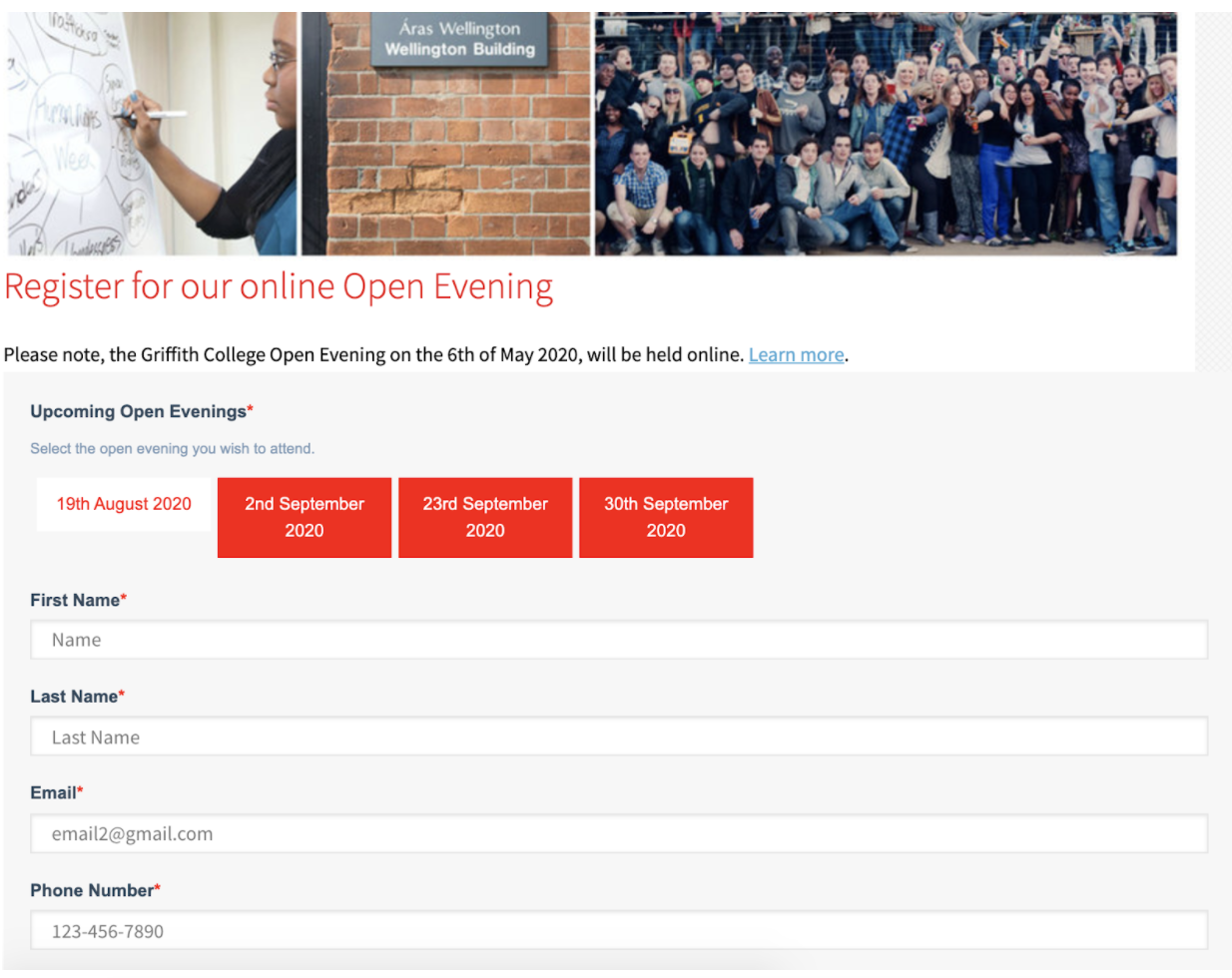
Often, events like Griffith’s are hosted on popular platforms such as WebinarJam, ClickMeeting, and GoToWebinar. With plenty of different software options out there, your school will have no trouble finding one that perfectly aligns with its needs—just make sure that you do a trial run the first time you use a program.
This type of event is great for webinars that are highly structured or professional in nature. However, if you want to create more of an informal event, or engage with the audience throughout, consider hosting your virtual event on social media.
While the video conferencing platforms mentioned above offer various features for engaging with participants, social media events make it as easy as possible for prospective students to interact with your school in real time. That’s because your prospects are likely more familiar with social media platforms, and therefore are more likely to engage during them.
The top social media channels (Facebook, LinkedIn, Instagram, and Twitter) each have their own live streaming features, so you can select the one which fits your prospective student personas best. Although each channel’s service differs slightly, they all allow prospects to comment and react throughout the event, which can be especially helpful for information sessions or other events where you want prospects to directly connect with your school’s staff.
Example: An Instagram Live broadcast from EC English Language Centre featuring an instructor touring around the school and answering questions.

Creating a Promotional Digital Marketing Strategy for Schools’ Events
Once you’ve ironed out your event details, it’s time to start promoting it. Hosting an event with great speakers, memorable content, and helpful resources is one thing—but having people register for it and actually attend is another.
If you want to maximize attendance—and thereby make the most of the time you spent preparing for it—a robust digital marketing campaign is a must. That means updating your website, creating email workflows, and sharing the event on social media. But those are only the essential elements: if you have the resources, and want to take your promotional strategy to the next level, consider adding content to your higher education digital marketing mix.
Updating Your School’s Website
Those highly interested in your school are likely making multiple visits to your website—and these are the same kinds of prospective students that would probably be interested in attending an online event.
Therefore, you may want to consider promoting your virtual recruitment event on your school’s homepage so visitors can discover it as soon as they land on your site. If you’re hosting a niche event, this may not be the best move, but those that appeal to a wide audience could be a valuable addition to your homepage.
To do so, you could add a CTA to your header, for instance, or include an image promoting the event in a prominent position on your school’s homepage.
Example: A CTA on the main navigation of Cumberland College’s website directing visitors to register for the school’s online information session.

You could also promote your event across your school’s site through CTAs on program pages, blog posts, and any other relevant pages. This tactic works for general events, of course, but can be especially useful for niche events, too, as prospects who visit specific pages would likely be interested in an event on the same subject.
Example: A program page on Centennial College’s website, with a tab that directs users to events related to the course at hand.
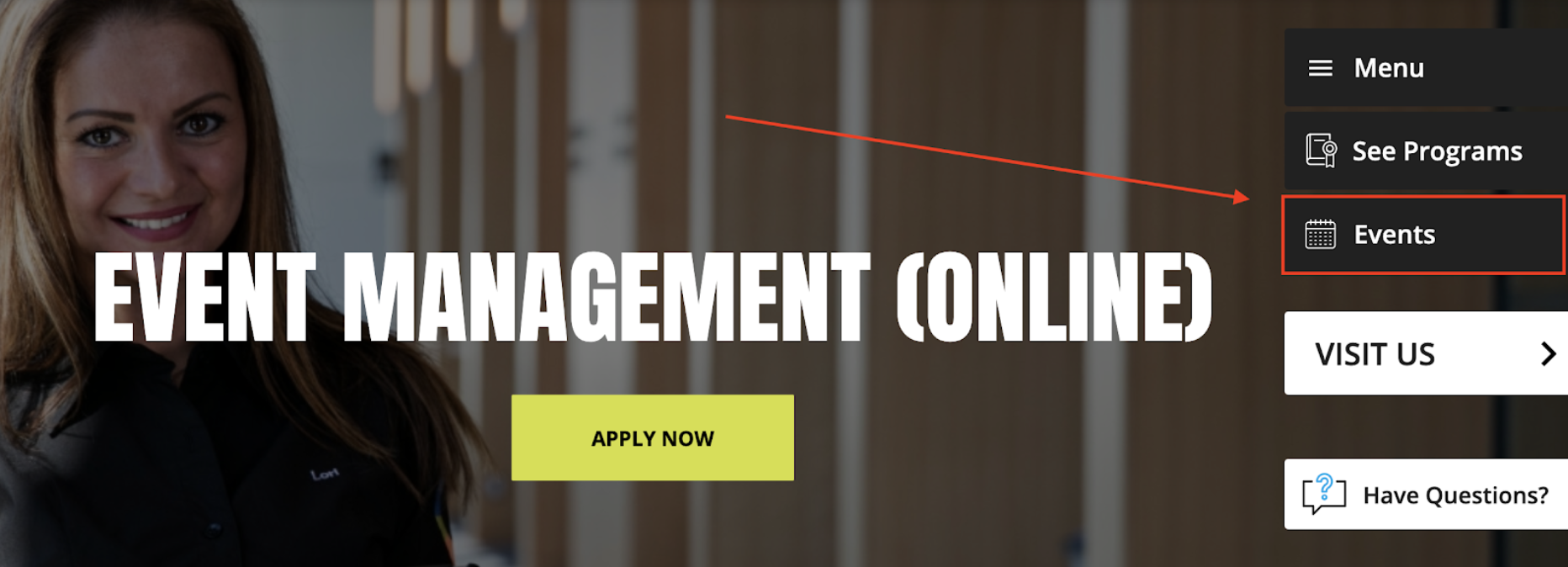
Email Marketing for Virtual Events
Out of all the higher ed digital marketing strategies for virtual events, email is arguably the most important. After all, it is the most direct way to invite your student contacts. Depending on the event, you could invite the entirety of your new leads, or target certain prospects by segmenting your contacts by demographics, lead stage, program of interest, etc.
Keep in mind, however, that email marketing is also arguably the strategy with the most moving pieces. A robust email campaign for a virtual event will include invitation mails, confirmation mails, and reminder mails for registrants—and that’s only the bare minimum.
If you’re looking for a place to start, consider drawing out a workflow with the different emails you want to send (for both those who register and those who don’t) as well as timestamps that indicate when you intend to send them out.
To set up these workflows, having a CRM and marketing automation system is highly beneficial. That way, you don’t have to monitor your registration list every day and send out emails manually. In addition to efficiency, you’ll also maximize effectiveness, as emails are sent out to precisely the right people at precisely the right time.
Example: A webinar email workflow with customized emails for those who register and those who don’t after the initial invite email is sent.
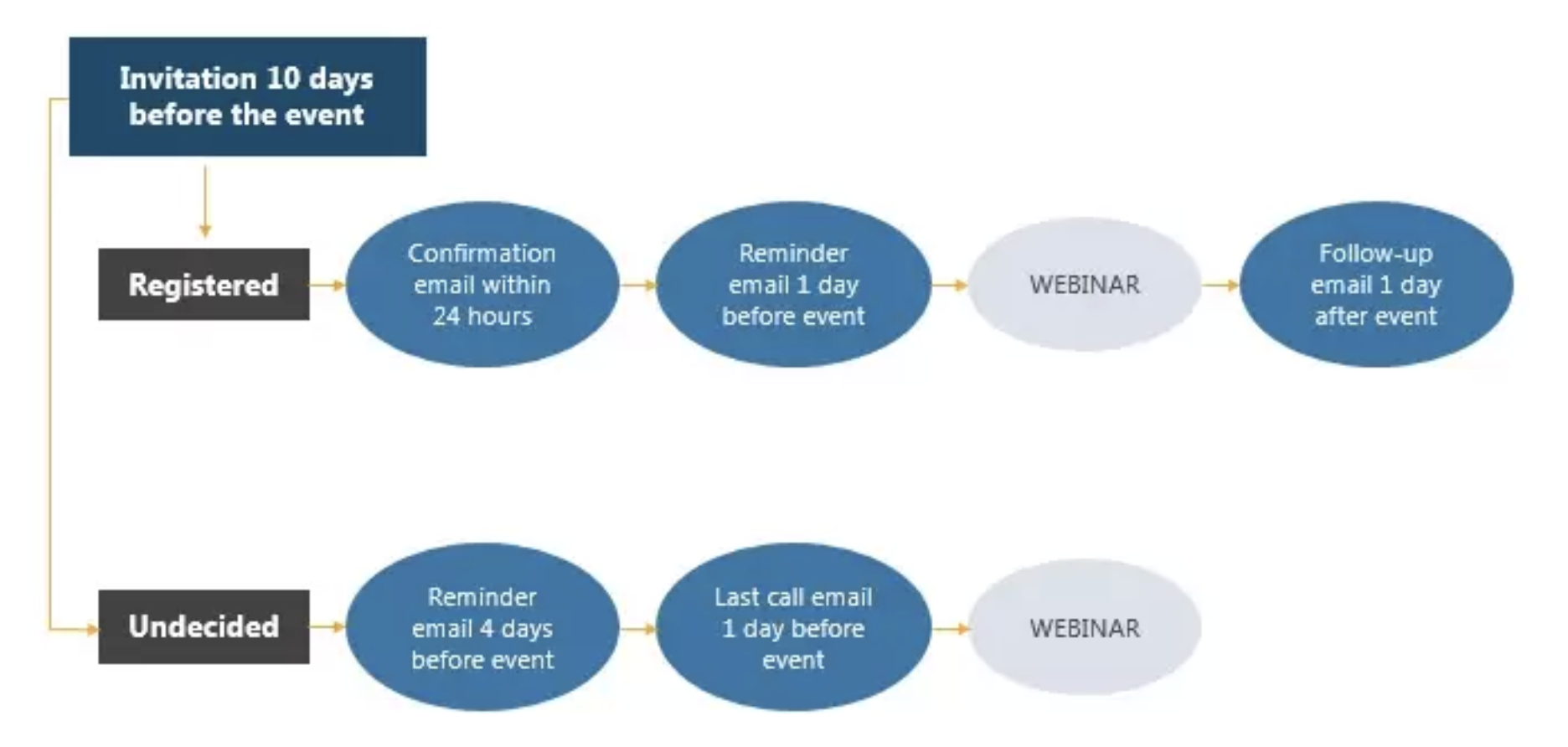
The next step is—you guessed it—the email content. The blood, sweat, and tears you put into creating well-designed emails with eye-catching subject lines and valuable copy will certainly pay off in the number of event registrations you receive.
Example: A segment of an email from Suffolk Law School promoting its virtual admissions event. The message is short, simple, and to the point, listing the event outline in bullet point form as well as a link to register.
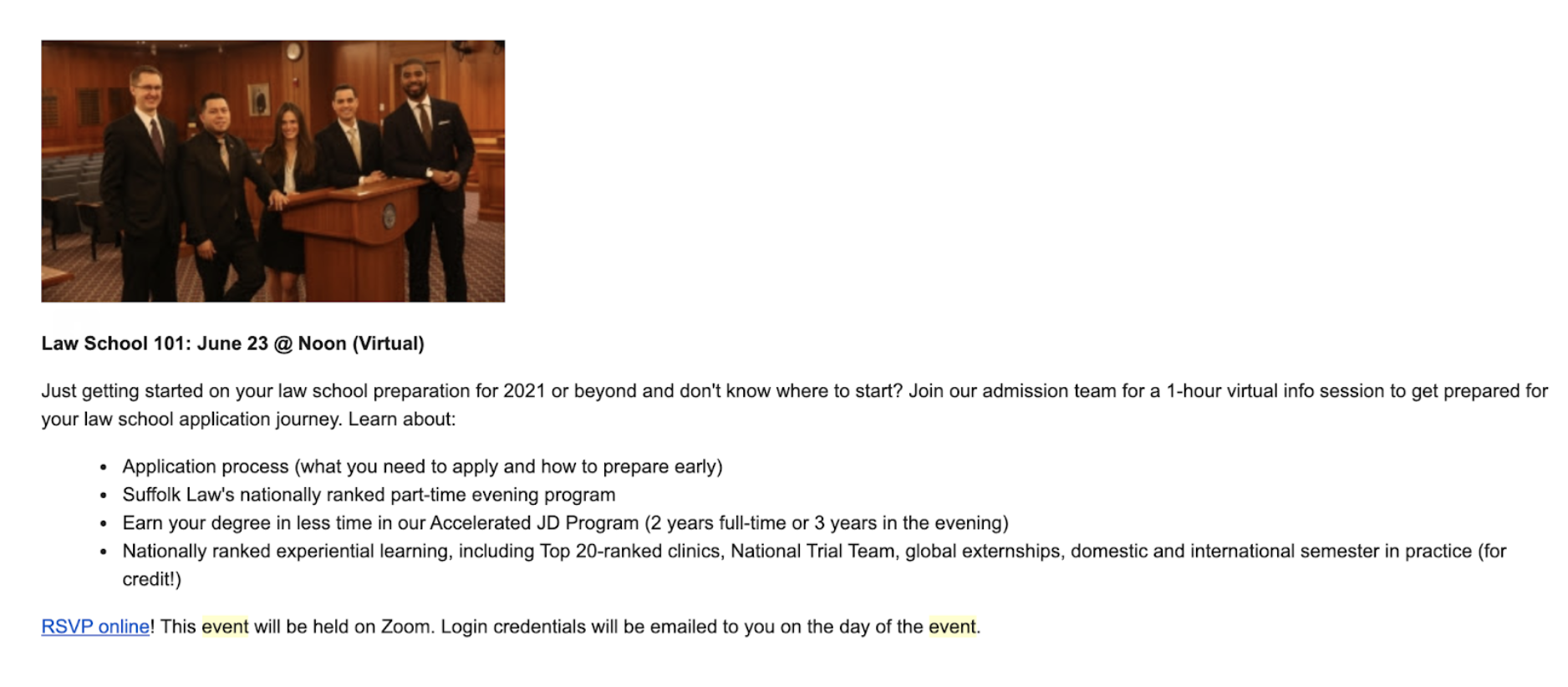
Paying close attention to the details in your emails is especially important in the case of online events. While virtual events excel in their convenience and practicality, the potential for technical difficulties is something to keep in mind.
With that being said, make sure to include detailed instructions for your online event in your emails—especially the reminder mails for registrants. Is there a link that attendees need to click? An application they’ll need to download beforehand? Any steps they should take (like disabling pop-ups) to mitigate the chance of technical difficulties?
Including these details beforehand will mitigate headaches for your admissions stuff and allow prospects to enjoy more of the event.
Online Event Promotion on Social Media
Since most of your prospects are likely spend a great deal of time on social media, it’s a great way to get out word of your upcoming event.
This could be as simple as adding some posts to your social media schedule, or as robust as creating a multichannel strategy complimented by paid advertising.
Example: A Twitter post from International House, a language school provider, promoting its online symposium. Simple copy, an emoji, and a link make this a well-rounded post.

If you want to get extra traction out of your social media posts, you have two options: boosting posts and creating social media ads. If you’re looking for a simple way to grow your registration list, boosting is a great option for your school, but if you have your sights set higher, and have the capacity to launch an ad campaign, the latter is best.
Boosting involves taking a post you’ve already created, such as the example above, and paying an extra fee to promote your post to a certain audience size. You can also target your audience through broad parameters such as demographics.
Social media ads, on the other hand, are slightly more complicated to set up. You’ll need to design your ad, create copy, and choose from a variety of detailed targeting parameters. Although this option takes more time and resources, it will generally generate a better ROI since you’re putting more attention into the posts both in terms of the content and the targeting efforts.
Content Marketing for Online Recruitment Events
Digital marketing for schools is all about priorities. Some campaigns will be at the top of your list, while others have less time and resources dedicated to them. If a virtual event has a prime spot on your school’s priority list, consider creating content—such as blogs and videos—that promotes it.
This will be the cherry on top of your promotional efforts. These resources could convince additional leads to attend, or solidify your event in the minds of those who’ve registered so they don’t forget about it after signing up.
Example: A virtual event recap on Webster University’s blog. In these blogs, Webster also includes a preview of their next online event as well as a link to the registration page. This is a great way to both promote new events and provide an event summary for those unable to attend.
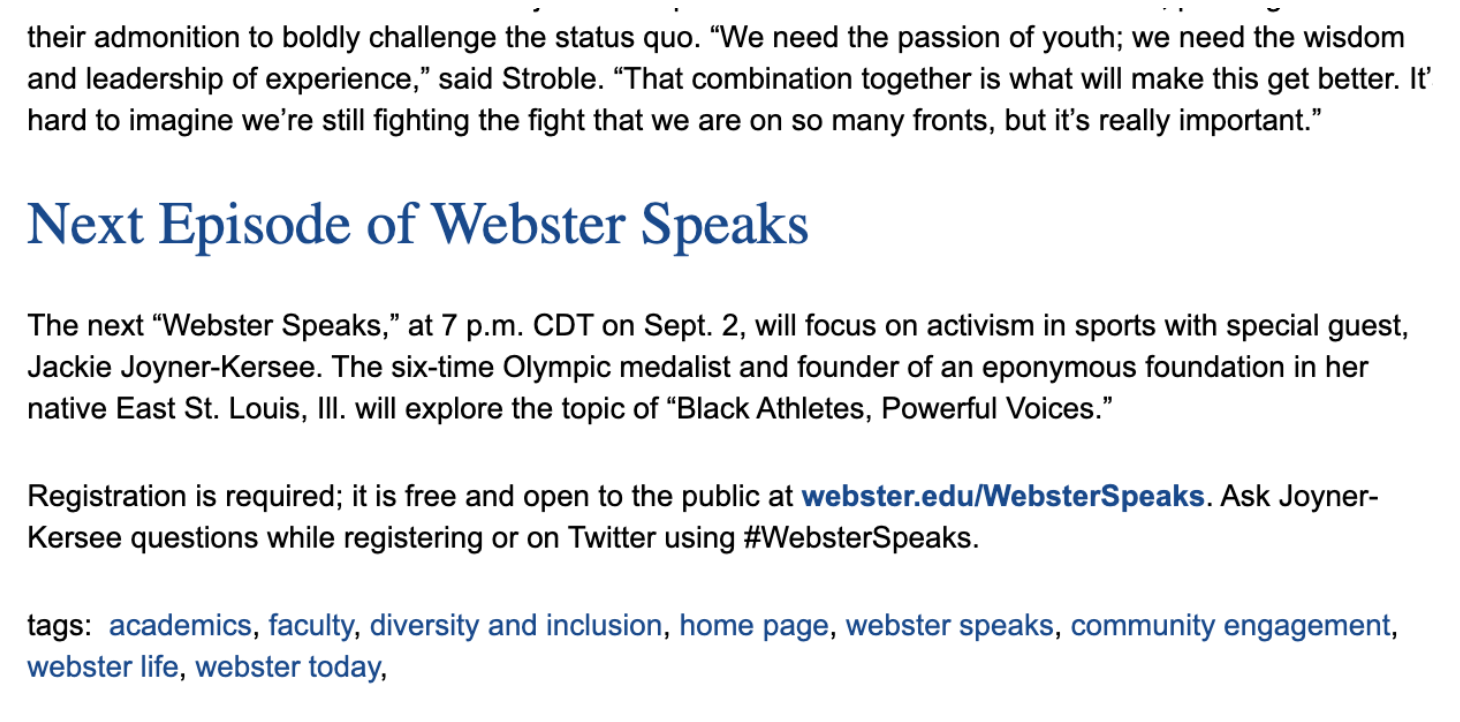
Videos and infographics are also great ways to promote your event—especially through email or on social media—as visuals are great at attracting attention in cluttered inboxes or rapidly updating timelines.
Post-Online Event Steps for Your Higher Education Digital Marketing Strategy
It’s logical to think that the event itself is the most important part of your overall campaign. While a good quality event is essential for any sort of success, don’t underestimate the importance of what comes after.
Once your event wraps up, prospects are in the perfect state to convert: they’ve just given your school their undivided attention, and in return, you’ve provided them with countless reasons why they should apply.
Post-event follow-up is the perfect way to target those inspired by what they’ve learnt about the school and encourage them to act.
One of the simplest ways you can make the most of this precious time is by recording your event and sharing it with those that attended for future reference, as well as for those that did not so they know what they’re missing out on.
The ability to record your events with ease is one of the biggest benefits of hosting virtual webinars in contrast to in-person events. Recording your event is easy and is built into most popular videoconferencing platforms. Additionally, social media platforms will automatically record your event for you, so you don’t even have to worry about remembering to press “Record” before the event starts.
From there, you can post the recording to your website, email it out to the registrants, and, in the case of social media events, share it across channels. You may also want to post the recording on your website so new leads can access it.
Being able to easily save and distribute your virtual events makes them valuable long-term recruitment resources. Your future prospective students will be able to view them—or, in effect, attend them—months after they were hosted. As ‘the gift that keeps on giving’, virtual recruitment events are becoming an increasingly important part of many school’s recruitment strategies, and their popularity shows no sign of slowing even as many schools reopen their campuses.

